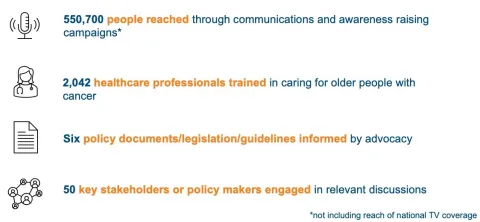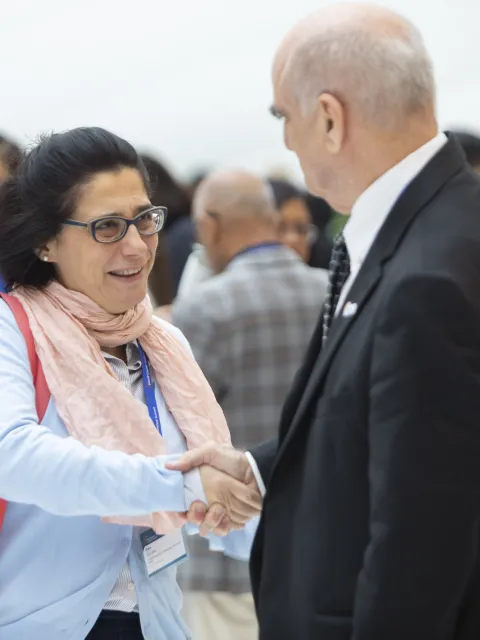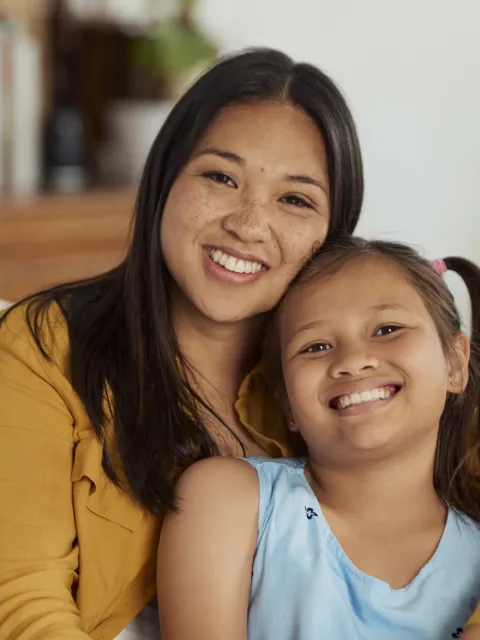Towards fairer access to cancer care for older adults
Through its partnership with Sanofi on Cancer and Ageing, UICC supported five member organisations in its Cancer Advocates programme working to improve access to cancer services and care for older adults.

More than half of all people who have cancer are over 65 years old, and this number is predicted to rise as populations age globally. Yet, many health systems in all income settings are not prepared to address the specific needs of this population. Older adults, therefore, face significant barriers in seeking and receiving appropriate diagnosis, treatment and quality-of-life care.
In most countries, there is a lack of geriatric oncology expertise at the different levels of health care and early cancer symptoms can be wrongly attributed to the process of ageing, leading to late diagnosis. Furthermore, older adults often have other chronic conditions (or co-morbidities) that make managing their cancer more complex. Services, treatment protocols, medicines and programmes are also often not adapted for older adults, who are underrepresented in research and clinical trials.
Through the provision of dedicated grants to support advocacy efforts of member organisations in this field, UICC aimed to contribute to improved access to early detection, diagnosis, multimodal treatment and supportive care for older adults with cancer.
Five one-year grants were awarded to organisations in low- and middle-income settings to implement advocacy strategies over 12 months:
- Asociación Salvadoreña para la Prevención del Cáncer (ASAPRECAN), El Salvador
- Asociación Guatemalteca Héroes de Esperanza, Guatemala
- Kenya Network of Cancer Organizations (KENCO)
- National Cancer Council of Mongolia
- NGO Avesto, Tajikistan
The organisations focused on improving the training of healthcare professionals in geriatric care, integrating cancer and ageing strategies in national cancer control plans and universal health care packages, ensuring cost-free access to cancer medicines for people aged over 65, and increasing the availability of palliative care specifically tailored to the needs of older adults.
The collective reach and impact of the grants
Overall, more than half a million people were reached through communications and awareness-raising campaigns, with over 2,000 health care professionals trained in geriatric care, 50 key stakeholders or policymakers engaged in advancing the needs of older adults in cancer care, and six policy documents, legislation or guidelines were developed.

In addition to informing national plans, policies and technical guidelines, providing specialised training for healthcare providers and spotlighting the needs and challenges of cancer and ageing, the grants also contributed to the development of multi-disciplinary networks and provided a voice for patients over 65 years in communications, meetings, and as advocates themselves. Each organisation, unique in their approach, reported key highlights and lessons learned.
Asociación Salvadoreña para la Prevención del Cáncer
Following the adoption in early 2020 of a comprehensive health care policy for elderly persons (Norma técnica de atención integral en salud a la persona adulta mayor) by the Ministry of Health, ASAPRECAN focused on optimising comprehensive health care through capacity building and advocating for specific clinical recommendations for the older population.
ASAPRECAN organised a workshop, bringing in international expertise that benefited over 900 healthcare professionals who received specialised training in geriatric care. Furthermore, in partnership with key stakeholders, a manual on comprehensive geriatric assessments was created and included in the Technical Guidelines for Comprehensive Cervical and Breast Cancer Care.
Asociación Guatemalteca Héroes de Esperanza
In Guatemala, adults over the age of 60 diagnosed with cancer often lack timely diagnosis as well as access to quality treatment and medicines.
With a focus on adapting legislation to provide access to free medicines for older adults living with cancer, Asociación Guatemalteca Héroes de Esperanza, contributed to the Technical Working Group responsible for modifying the Public Policy on Medicines and Other Health Technologies following a legal analysis of the access, diagnosis and treatment of cancer in older adults.
The organisation also leveraged World Cancer Day, 4 February, to raise awareness about the rights of older adults with cancer by contributing to a national radio programme.
KENCO
The primary goal of KENCO’s advocacy was to build awareness and drive demand for policy and legislative change and investments in care for older adults, as well as increase the expertise of health professionals in geriatric care. While there is not a large population of people over the age of 65 in Kenya, KENCO and key media outlets harnessed the power of storytelling to raise their voices and train them as advocates to ensure that their right to health and adequate cancer care was not forgotten.
The organisation also partnered with the National Cancer Institute and the National Cancer Control Programme to sensitise over 600 health professionals who provide cancer or palliative care services to older adults.
National Cancer Council of Mongolia
The National Programme on NCDs, approved by the Mongolian government in 2016, does not address the needs of adults aged 65 and over who represent 38% of diagnosed cancer cases.
The National Cancer Council of Mongolia undertook a situational analysis of cancer among the ageing population identifying challenges related to screening, early detection, treatment and palliative care. This situational analysis informed the development of a policy brief aimed at decision makers and a video to raise awareness shared via local media. Recommendations were included in the National Plan against Cancer 2021-2024.
NGO Avesto
A key barrier to providing palliative care to older adults in Tajikistan is the lack of information regarding international standards and local legal frameworks for the provision of home-based palliative care for people living with cancer.
NGO Avesto, therefore, worked on the development of recommendations for organising palliative care at the PHC level, which were approved by the Ministry of Health and Social Protection of Tajikistan. NGO Avesto were also successful in incorporating palliative care training, including for the ageing population, into the State Medical University’s curriculum and as a compulsory subject at all 11 nursing schools and four medical colleges in the country.
Last update
Wednesday 07 September 2022
